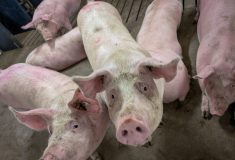Japan, already a $4 billion market for Canadian food exporters and the second-largest customer, has agreed to open free trade talks with Canada.
“This is a truly historic step that will help create jobs and growth for both countries,” prime minister Stephen Harper said in Tokyo March 25 when announcing the negotiation.
Japan is Canada’s fourth-largest export market already, and “I’m told we have the potential to increase out exports to Japan by as much as two-thirds.”
Canadian grain, pork, livestock and meat exporters immediately predicted major gains for Canadian agriculture and food producers.
Read Also

New Quebec ag minister named in shuffle
Farmers in Quebec get a new representative at the provincial cabinet table as Premier Francois Legault names Donald Martel the new minister of agriculture, replacing Andre Lamontagne.
“Japan is the largest predictable market for Canadian canola seed, the second-largest market for Canadian malt and Canadian pork, the third largest market for Canadian wheat and the fourth largest market for Canadian beef,” the Canadian Agri-Food Trade Alliance said in a March 25 statement from Tokyo, where the agreement was announced.
CAFTA executive director Kathleen Sullivan was part of a large industry contingent that flew to Asia on the trade mission with Harper, agriculture minister Gerry Ritz and other ministers.
“A free trade agreement with Japan could result in additional exports of high-value Canadian agri-food products to that country,” she said.
At the moment, high tariffs and non-tariff barriers block increased Canadian access to the Japanese market.
Still, despite the barriers, canola and oilseed exports are worth $1.4 billion, pork sales are close to $900 million and wheat exports are worth almost $500 million.
CWB president Ian White, Canadian Gain Commission chief commissioner Elwin Hermanson and grain grower representatives were part of the trip to assure Japanese buyers that supply arrangements will be stable after the Aug. 1 end of the CWB monopoly.
Ritz told a March 26 news conference from Seoul, South Korea, that the Japanese are considering Canada’s request to increase beef import eligibility to meat from animals up to 30 months from present 21-month limits.
The Canadian Cattlemen’s Association says that could more than double beef sales to more than $160 million in the first year.
Ritz said no target deadline has been set for a deal, but both sides want to move quickly.
“Japanese buyers have expressed the desire to move this forward as quickly as possible,” he said. “We agree with them.”
He said he will use his time in South Korea this week to urge Koreans to re-launch free trade talks with Canada.
They have been dormant for several years, and with a recent U.S.-Korea deal, the Canadian pork industry argues that it will soon be uncompetitive in one of its key export markets without a Canadian tariff-reducing deal.














